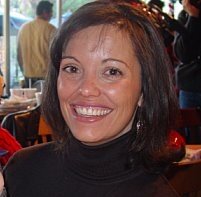“My mountain is your perceptions. My other mountain is me.” – Mark Horvath
According to NPR, Mark Horvath is “a former Hollywood insider, who has been a drug addict, con artist and, for a brief period, homeless.”
 Fifteen years ago, after being fired from a high paying job at a television company, Mark dealt drugs and tried his hand at credit card fraud, neither very successfully.
Fifteen years ago, after being fired from a high paying job at a television company, Mark dealt drugs and tried his hand at credit card fraud, neither very successfully.
For a period, he found himself living on the streets.
Ultimately, he sought help and found faith at a local shelter.
After getting clean, he relocated to the Midwest and worked for a televangelist.
Two years ago, he lost another job, all his money and his home.
He found himself back in Hollywood applying for food stamps and thinking he would soon find himself homeless again.
Having been homeless, Mark notices the people on the streets.
So many of us look away, feeling awkward, helpless and conflicted.
Mark decided to make a difference and he started with socks.
“Everyone feeds the homeless,” Mark said, “but clean socks are like gold.”
He started washing discarded socks from a local bowling alley and handing them out to homeless people.
Eventually, he started interviewing the homeless and posting their interviews on his website, InvisiblePeople.TV.
The website features video after video of homeless people telling their own stories in their own words.
Powerful stuff.
I met Mark at the SXSW Conference in Austin last month and again in Atlanta at theNTEN nonprofit technology conference ten days ago.
Because of Mark’s current work on homelessness, he was asked serve as a panelist in a session about moving mountains, his task was to inspire nonprofit innovation in tackling our largest social issues.
In Mark’s case, his success has largely been driven by the power of social media.
His raw and real interviews with homeless people are widely shared on blogs, Facebook and twitter and the resulting website traffic generates donations for his work.
The viral and grassroots nature of his success has attracted corporate attention as well. Hanes provides his clean socks now and last year, Ford Motor Company gave him a car for a cross country story gathering trip.
Even with corporate sponsorship, Mark said that sometimes still eats in homeless shelters because he doesn’t always have enough money to buy his own meals.
“I drove 11,263 miles in a borrowed car last year without an income,” Mark told us.
Regardless, Mark remains committed to making the homeless visible.
He believes that by hearing their stories, we will find compassion, that we will begin to understand that their humanity and ours aren’t really so far apart.
During his talk, Mark told us that when he started InvisiblePeople.TV, he had a laptop, a video camera, a microphone and forty five dollars to his name.
Throughout his journey, people who heard about him online offered their help and support.
To me, Mark’s work represents the very best kind of social activism — the kind where an individual takes action that changes the world.
When he asked himself who was going to do something about homelessness, he found that the answer was, “you are.”
National Volunteer Week is this week and the 2010 theme is “Celebrating People in Action.”
I’m celebrating Mark.
How would the world be different if each one of us, like Mark, applied our skills and talents, whatever they may be, to actions that improve the world?
What if each of us decided to begin climbing the tallest mountain?
To solve the hardest problems, we must be the leaders we’ve been waiting for.
To learn more about Mark Horvath, visit InvisiblePeople.TV, and read his blog.

 Today’s guest post comes from Ashley Cannady, an AmeriCorps National Direct Member serving with HandsOn Network.
Today’s guest post comes from Ashley Cannady, an AmeriCorps National Direct Member serving with HandsOn Network.

 They formed an organization called Second Harvest that is known today as .
They formed an organization called Second Harvest that is known today as .
 After exploring I found the
After exploring I found the 


